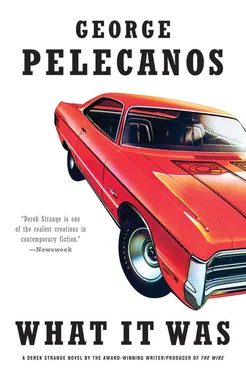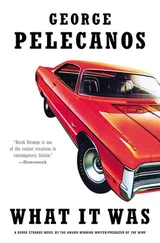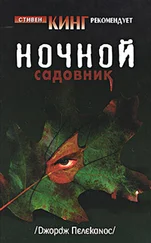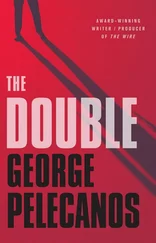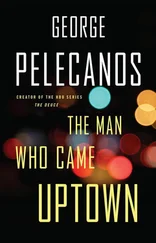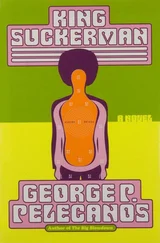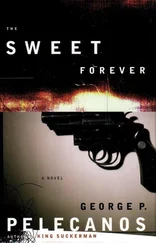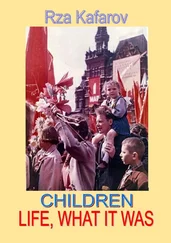Jones retrieved a couple Miller High Lifes, golden in clear glass bottles, and popped their caps. He handed one to Jefferson. Jefferson took a long swig, fitted the bottle between his legs, and pulled off the curb.
Roland Williams lived on T Street, between 13th and 14th, in a house he rented, paying cash, always on time, no references required, no questions asked. The owner of the house was one of several slumlords who had bought run-down properties, pre- and post-riot, and methodically flipped them at an enormous profit to the U.S. government for their “urban renewal” projects. In the late ’60s, the practice had been exposed in a series of Washington Post articles that had made a splash in the newspaper industry and on Capitol Hill. Reporters won prizes and promotions, but their work had little impact down here; five years later and the area continued to be in the grip of poverty and opportunists.
Williams’s row house, on the outside, was as blighted as any other on the block, but inside it was well furnished and nicely appointed. Williams had money. He was the neighborhood heroin dealer, known to most as such, and went untouched and unmolested by the law. Williams paid protection money to Mike Hancock, a Popeye who worked the Third District.
Williams was of the older school of heroin dealer who worked peacefully out of his house. He copped ounces, called “jumbos,” at 116th and 8th, up in Harlem. He bought from minor leaguers, black dudes who had scored from Italian button men who were low on the food chain themselves and connected to the Family. The run to Little Baltimore was Williams’s pleasure; he liked to go “up top” to the big city, do his thing, eat in one of those nice checkerboard-tablecloth restaurants they had, take his time, drive home slow.
Williams used mannite and quinine to cut his heroin, which generally was 4 to 12 percent pure when it hit the end user. Four was garbage, 12 a smoker. The temptation was to keep stepping on the dope to maximize profit, but if it was diluted too much a dealer would soon be out of business with a rep for selling trash product. Williams was not greedy, and he was known for delivering an honest kick.
He was a heroin user, but he had that under control. Like many in his line of work, he was functional. He laughed when he saw the TV shows with bad actors in dark-eye-circle makeup, playing strung-out junkies who had fucked up their lives. In Williams’s circle, it was macho to be an addict and know how to carry it.
It spoke to a general point of attitude. In his time, criminals were not amateurs. The burglars, car thieves, dope cutters, pickpockets, and flimflam artists he knew were all driven by the skills of their profession and pride in their work. There were few kids in the game. No one realized how soon all this would change.
This last batch of dope he’d copped had not yet been paid for. Williams was short on money at the time of purchase, as he’d recently put a deposit down on a sweet ’69 Mark IV that he didn’t need but wanted. His contact up top, man named Jimmy Compton, had let him slide because he was a longtime customer in good standing. Williams had brought the product home, cut it down, and packaged it in bundles of twenty-five glassine dime bags. Runners, paid with a shot, would deliver the dimes to residences and places of business. Clients were listed in a book he kept well hidden. Williams had the bundles in paper bags in two locations: the suit carrier in his closet and in a wall cutout behind a hutch in his living room. His intent was to sell the shit, give his New York connect his payment, and add a little bonus to it, to acknowledge the man’s trust.
Williams put on some nice threads, as he always did this time of night, and prepared to leave his place for a little something at Soul House, his favorite bar, on 14th. It was a cave, really, just a simple dark room with low music coming from the juke. A spot where he felt comfortable. There he played the role of up-and-coming businessman, sitting at the stick, having himself a quiet drink. Mid-shelf scotch in hand, sometimes with a young lady seated beside him. Thinking, I’ve made it.
They parked on the 1300 block of T, drank off a couple more High Lifes, smoked cigarettes, and waited for near dark to come. They were watching a white brick row house with blue shutters, had a little old-time porch on the front. Jefferson had been watching the house for several nights.
“There he goes now,” said Jones.
“Told you,” said Jefferson. “He leaves out the same time, early in the evening. Goes to that bar, Soul House, on Fourteenth. You can set your watch to it. How they do in London, England, with that big clock they got.”
“Roland Williams,” said Jones.
“That’s Ro-Ro, went to Cardozo?”
Jones shook his head. “ Long Nose Roland, outta Roosevelt.”
“I can see it,” said Jefferson.
Roland Williams, with the nose of an aardvark, late twenties, wearing big-bell jeans and a print shirt. He locked the door of the house behind him and walked down the sidewalk.
“Let’s go,” said Jones.
They got out of the Buick and crossed the street. They came up quick behind Williams, who had turned his head and quickened his step but too late. Jefferson produced an old police-issue .38 with cracked wood grips held fast by electrical tape, and put the barrel of it to the small of Williams’s back.
“Keep walkin, slick,” said Jefferson. “Straight to the alley.”
Williams complied. He moved surely and did not appear to be too shook. They turned into an alley that ran behind Williams’s block, uneven stones in concrete, hard beneath their feet.
“Stop and turn around,” said Jones. “My man’s got his thing on you, so don’t be funny.”
Williams turned to face them. Somewhere near, a big-breed dog, housed behind a chain-link fence, barked lazily. There was no light back here, save the faint bleed of a streetlamp situated at the end of the alley. It was hard to read Williams’s face, but his voice was steady.
“Y’all want my money,” said Williams, “go on and take it.”
“Give it here,” said Jones.
Williams removed folding money from his front pocket and held it out. Jones took it and without examination stuffed it in the patch pocket of his bells.
“Now the key to your crib,” said Jones.
“For what?” said Williams.
“ ’Bout to help myself to your heroin. I know you’re holdin.”
“Who...”
“Never mind who . He kissin dirt.” Jones nodded with his chin. “Give it up. I don’t want no loose dimes, neither. The bundles.”
“You don’t understand what you gettin into, brother. I got that shit on consignment.”
“Say what?”
“I don’t own it.”
“You got that right. It’s mine now.”
Williams sighed. They heard his breath expel and saw his shoulders sag.
Jefferson grew impatient and touched his pistol to the man’s cheekbone. “Tell him where the dope at.”
“What I got is in my bedroom closet,” said Williams. “In a suit bag.”
“That’s it?” said Jones.
“All of it,” said Williams. “Swear for God.” Williams was a poker player, and they could not read the lie in his eyes.
“Gimme your key.”
Jones left the alley with the key to Williams’s house and the key to the Buick. Jefferson kept the gun loosely trained on Williams, who calmly lit a cigarette. Neither of them spoke.
Fifteen minutes later, Jones returned. Williams ground the butt under his foot.
“You get it?” said Jefferson.
“Yeah, we’re good.”
Williams studied them. The tall, light-skinned dude had a distinctive look and a rep to go with it. Had to be Red Jones, who some called Red Fury on account of his woman’s car. He knew nothing about the little one with the gold teeth.
Читать дальше
